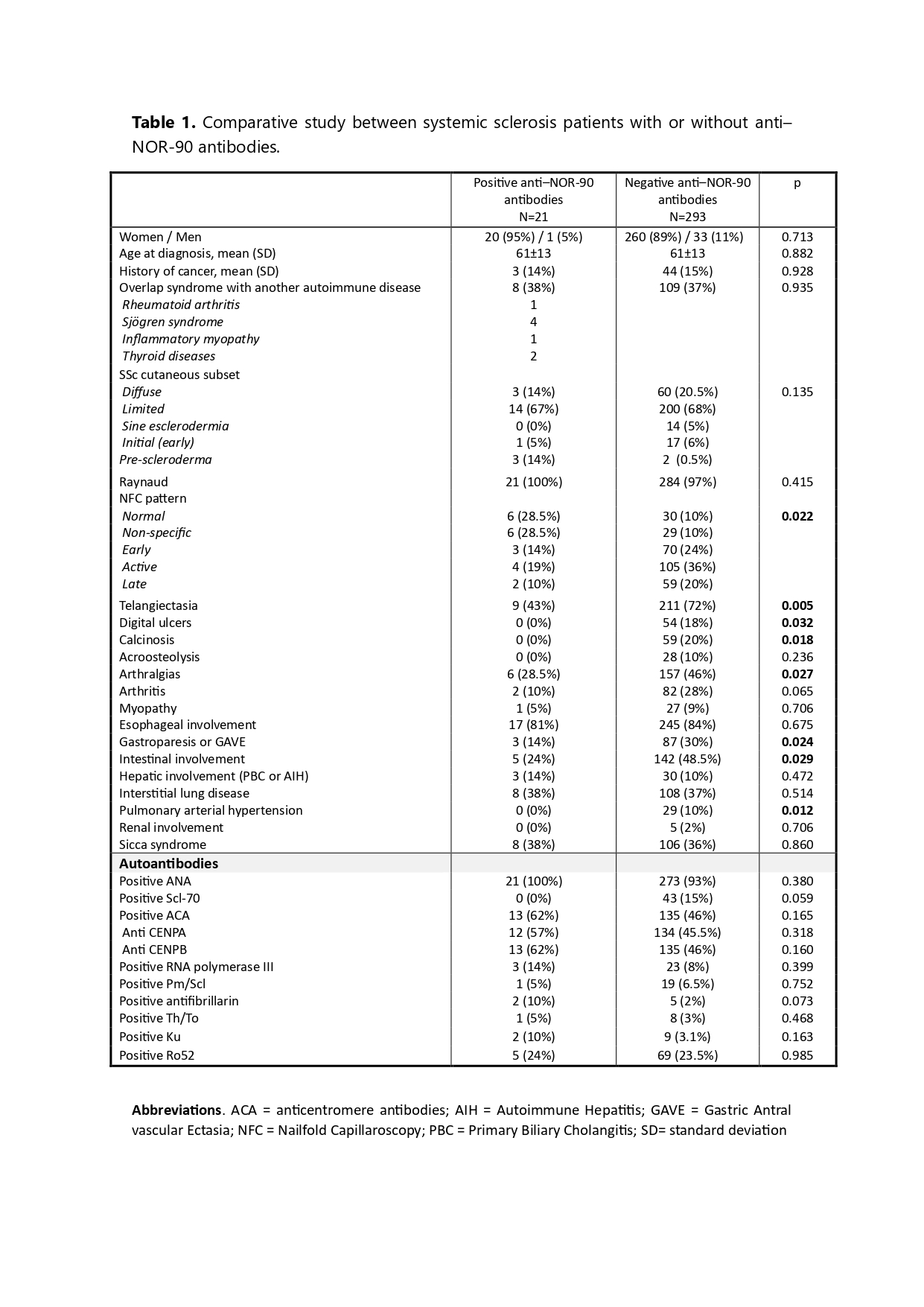Session Information
Date: Tuesday, October 28, 2025
Title: (2470–2503) Systemic Sclerosis & Related Disorders – Clinical Poster III
Session Type: Poster Session C
Session Time: 10:30AM-12:30PM
Background/Purpose: To analyze the clinical associations of anti-Nucleolar Organizer Region 90 antibodies (NOR90) antibodies in patients with systemic sclerosis (SSc)
Methods: Cross-sectional study of NOR90-positive SSc patients from two tertiary hospitals. Anti–NOR90 antibodies were detected using the EUROLINE SSc profile (IgG) kit (Euroimmun, Germany). Only patients with repeated moderate or strong positivity were included.
Results: Among the 21 patients with anti–NOR-90 antibodies (95% women), the limited cutaneous subset of SSc was the most prevalent (67%), followed by early disease (5%). Their main characteristics are summarised in Table 1. Nailfold capillaroscopy most frequently revealed normal (28.5%) or non-specific (28.5%) patterns, with only 43% exhibiting one of the three Cutolo patterns.All patients presented with Raynaud’s phenomenon (100%), and the most frequent manifestations included telangiectasias (43%), upper and lower gastrointestinal (GI) symptoms (oesophageal: 81%; gastric: 14%, predominantly gastroparesis; intestinal: 24%), interstitial lung disease (ILD) (38%), and arthralgias (28.5%).Among the 8 patients with ILD, 63.5% were asymptomatic at diagnosis. Pulmonary function tests at that time were preserved, with a mean (± SD) predicted %CVF of 107 ± 19 (interquartile range [IQR], 95.5–115) and a predicted %DLCO of 80 ± 18 (IQR, 72.5–91). No cases required rescue biologic or antifibrotic therapy, progressed to progressive pulmonary fibrosis, or underwent lung transplantation.Fourteen patients (67%) were also positive for at least one SSc-criteria antibody: anti-centromere (62%), including CENP-A (57%) and CENP-B (62%), and RNA polymerase III (14%). None tested positive for ATA/Scl70 antibodies.Compared with the 293 patients lacking these antibodies (see Table 1), individuals in the anti–NOR-90 group showed significantly less microvascular involvement, with lower frequencies of telangiectasias (43% vs 72%; p=0.005), absence of digital ulcers (0% vs 18%; p=0.032), and a reduced prevalence of calcinosis (0% vs 20%; p=0.018). They also had less frequent gastrointestinal involvement (gastric: 14% vs 30%; p=0.024; intestinal: 24% vs 48.5%; p=0.029) and a lower prevalence of pulmonary arterial hypertension (0% vs 10%; p=0.012). No significant differences were observed in other disease domains. This group also exhibited lower rates of RNAP III positivity.The association of anti–NOR-90 antibodies with a lower prevalence of intestinal involvement remained significant in multivariable logistic regression adjusted for ATA/Scl70, ACA, and RNAP III, with an OR of 0.332 (95% CI: 0.119–0.931; p=0.036; see Figure 1). The OR for gastric involvement (gastroparesis or GAVE) was 0.395 (95% CI: 0.113–1.374; p=0.144).
Conclusion: Patients with anti–NOR90 antibodies exhibit a distinct systemic sclerosis phenotype, primarily characterized by limited cutaneous involvement, less frequent microvascular and gastrointestinal manifestations, non-severe ILD when present, and absence of pulmonary arterial hypertension. These findings suggest a potentially milder burden of visceral involvement compared to patients without anti–NOR90 antibodies.
To cite this abstract in AMA style:
Narváez J, Castañeda S, Roig Kim M, Aguilar-Coll M, De Daniel Bisbe L, Dueñas M, Valero C, Morandeira F, González-Gay M, Nolla J. Phenotype of systemic sclerosis patients with positive anti–NOR-90 antibodies [abstract]. Arthritis Rheumatol. 2025; 77 (suppl 9). https://acrabstracts.org/abstract/phenotype-of-systemic-sclerosis-patients-with-positive-anti-nor-90-antibodies/. Accessed .« Back to ACR Convergence 2025
ACR Meeting Abstracts - https://acrabstracts.org/abstract/phenotype-of-systemic-sclerosis-patients-with-positive-anti-nor-90-antibodies/


.jpg)